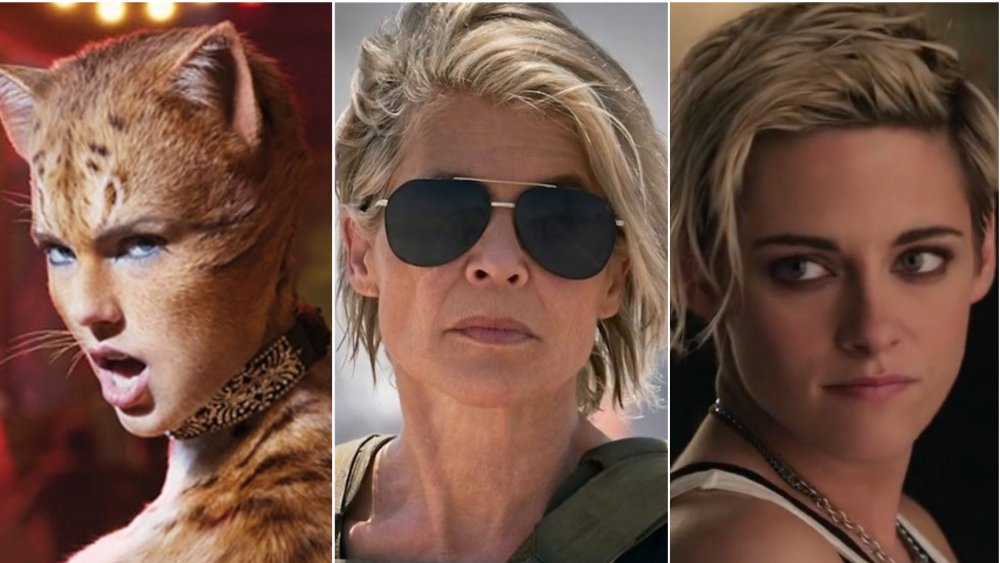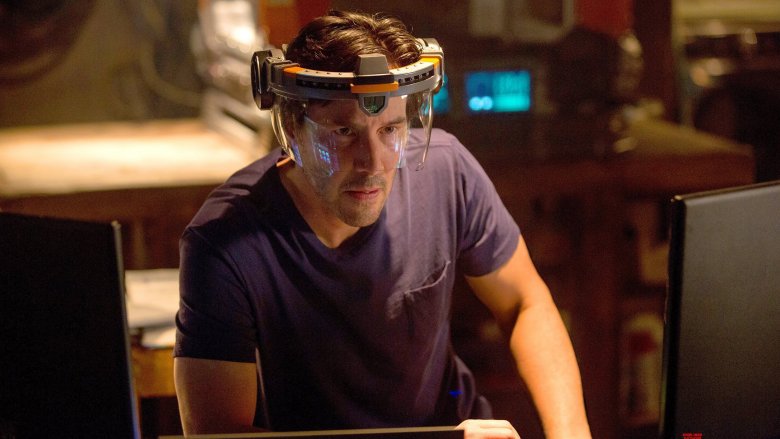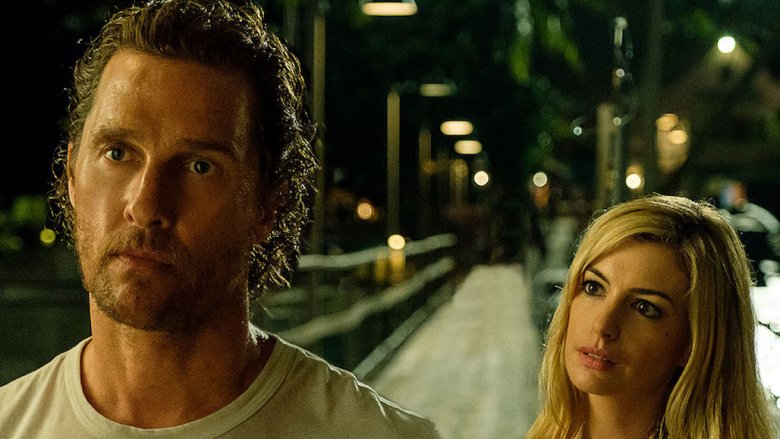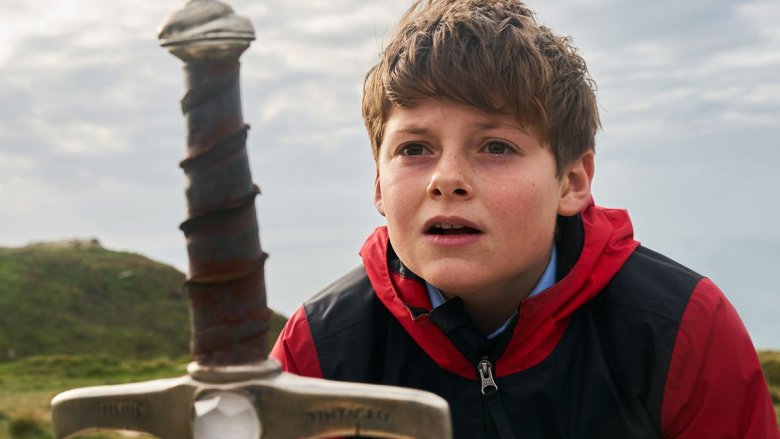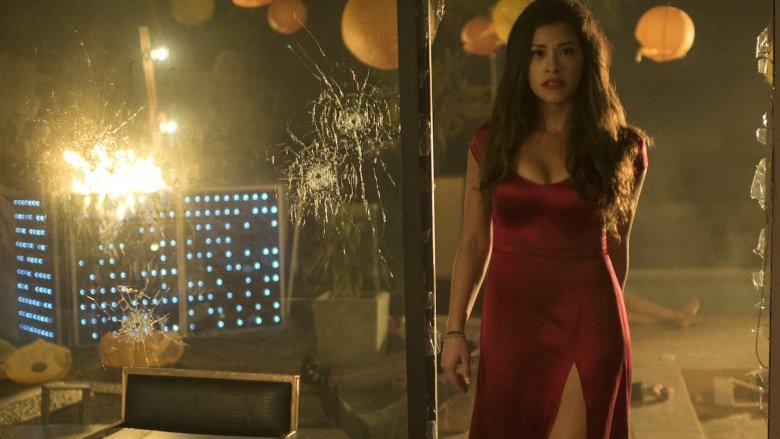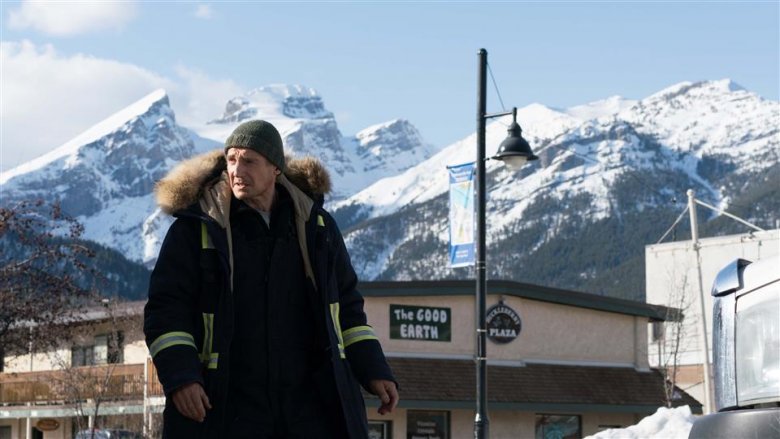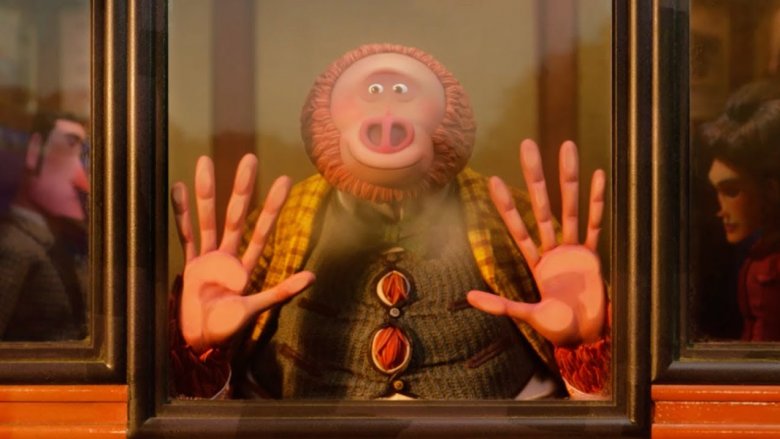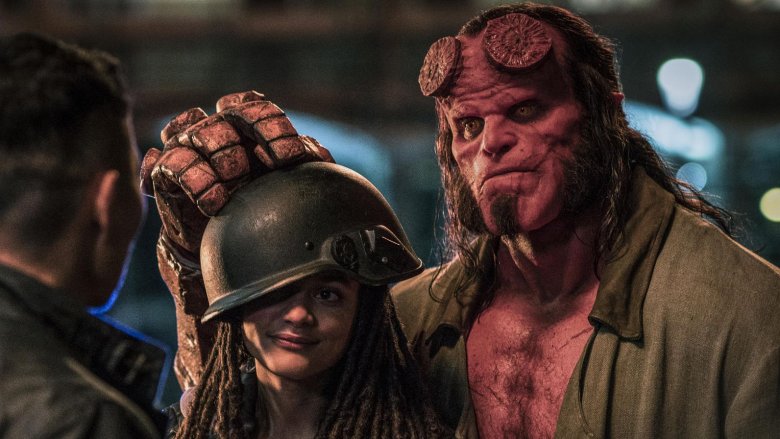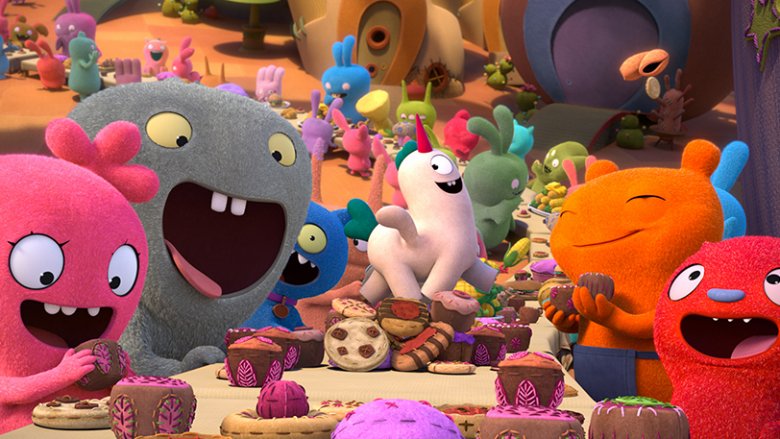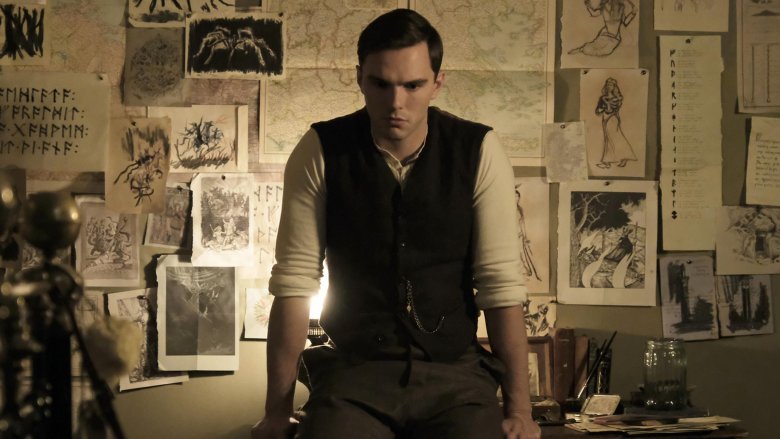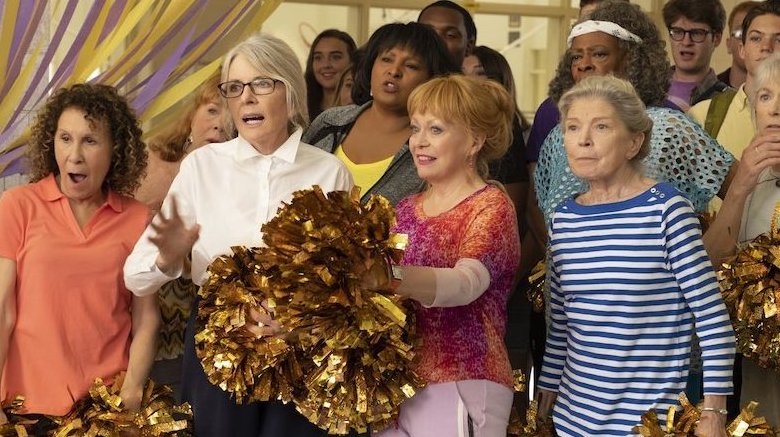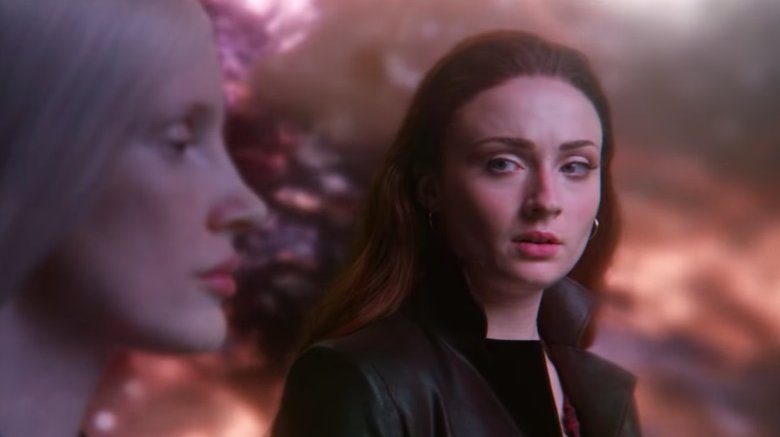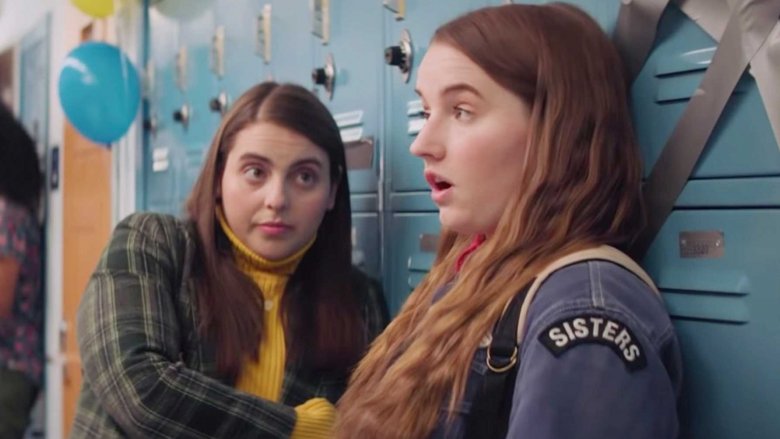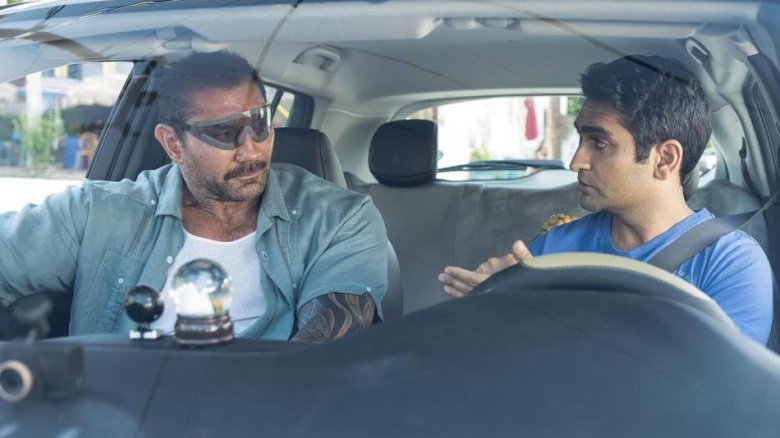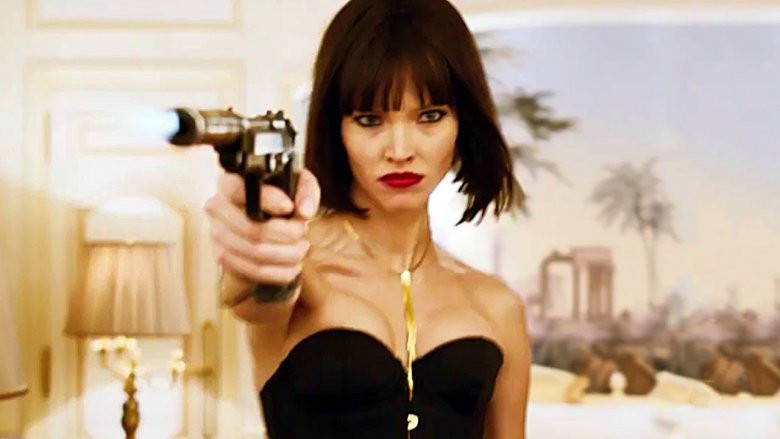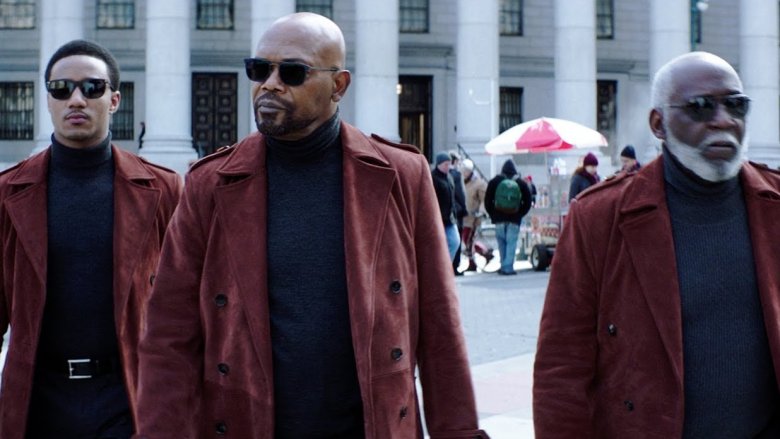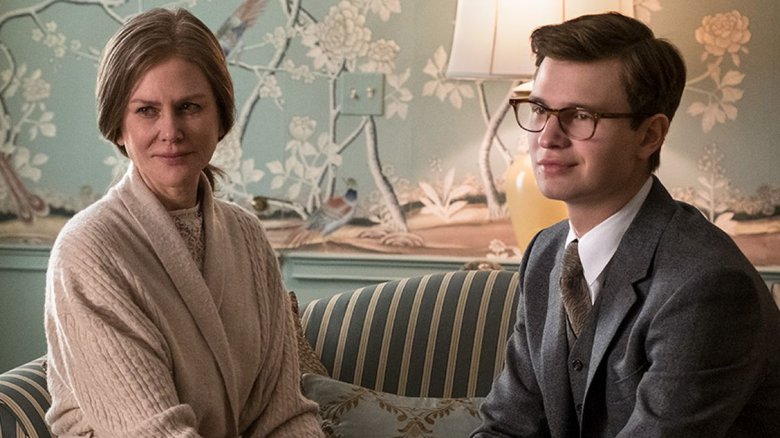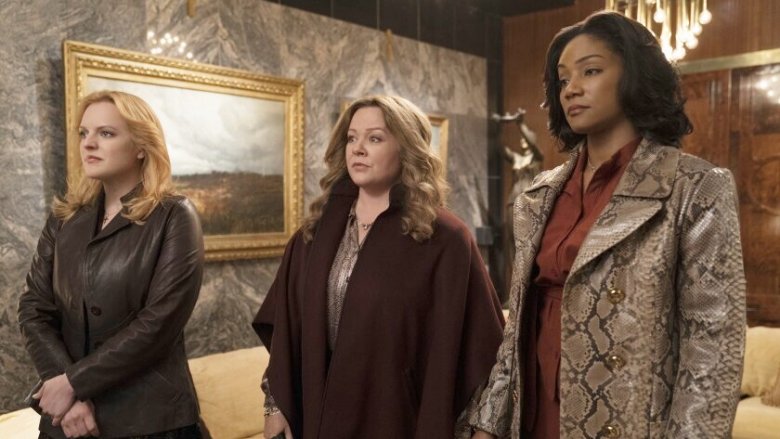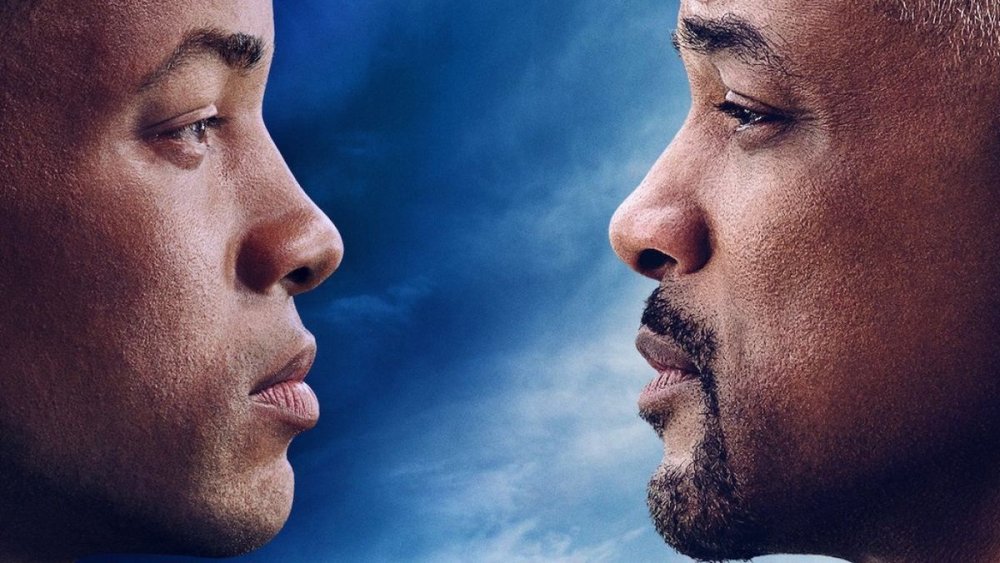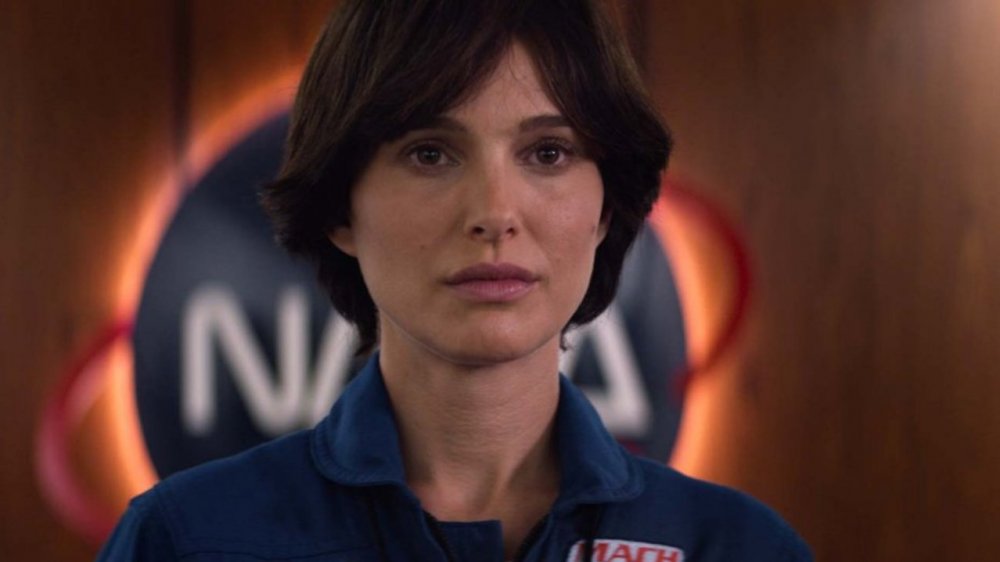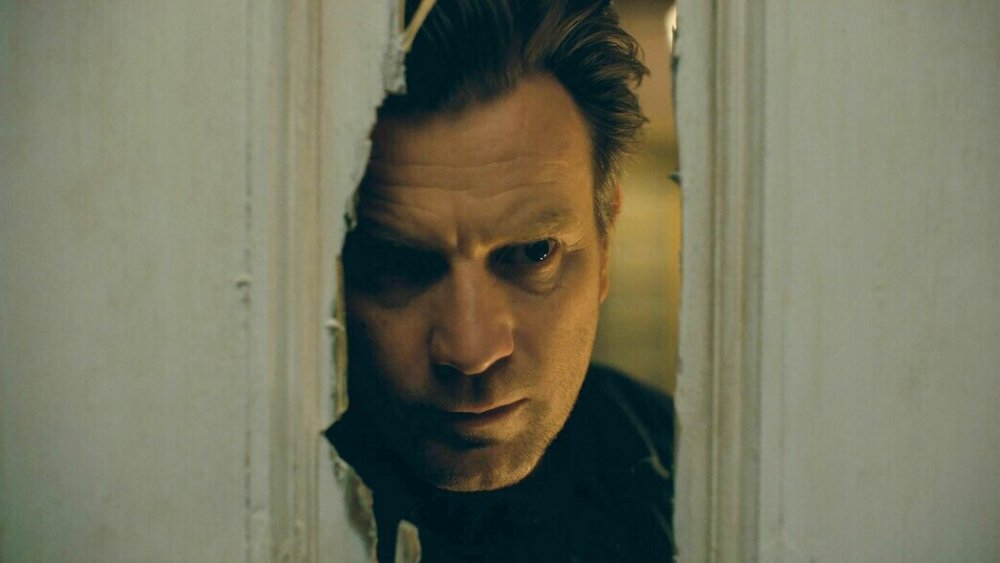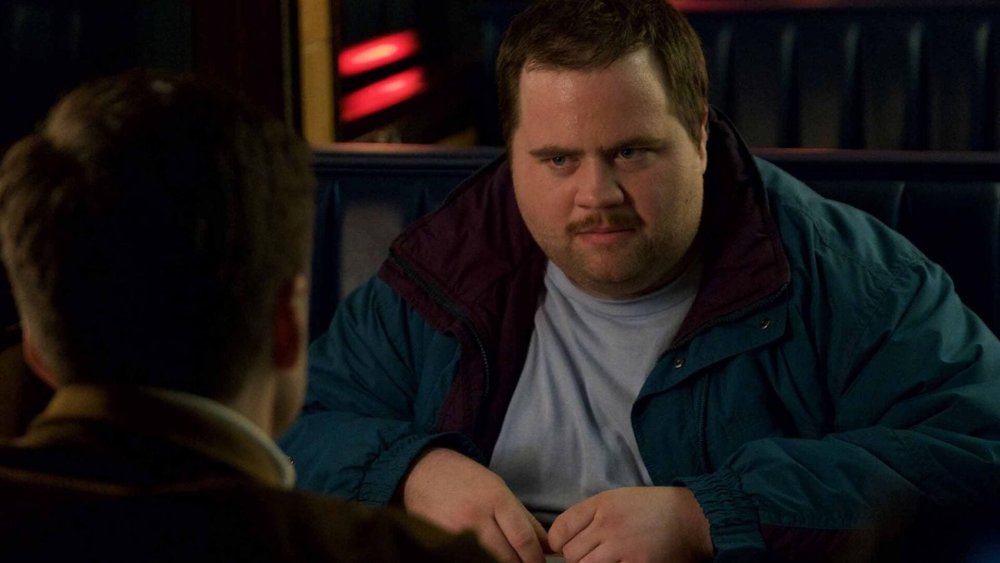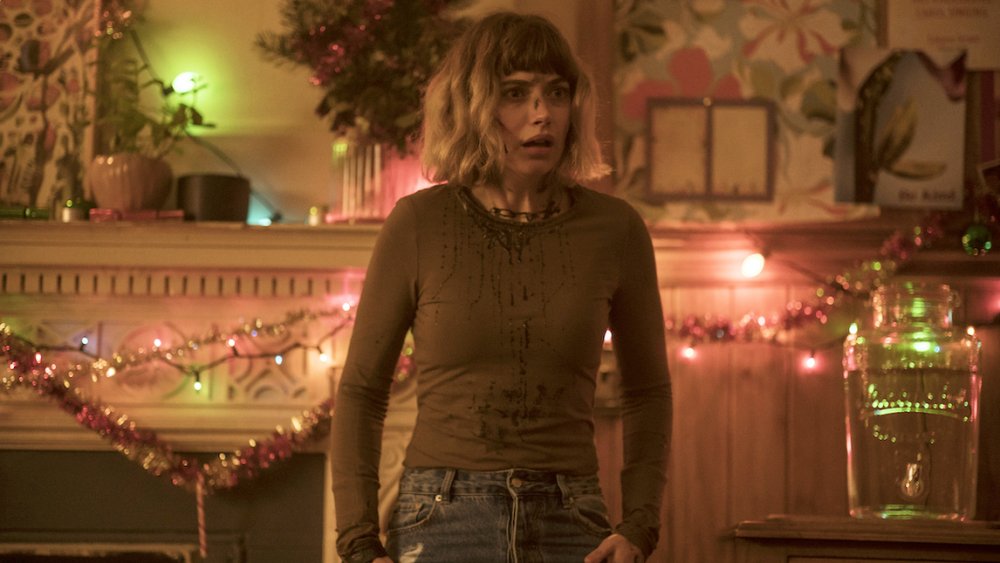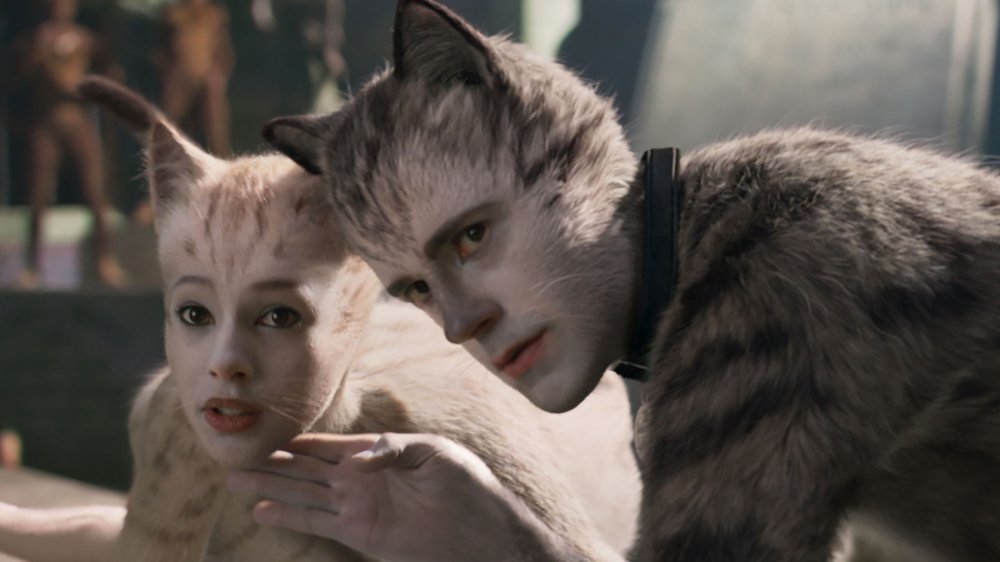Why These 2019 Films Bombed At The Box Office
To say 2019 is a big year for movies is something of an understatement, if for no other reason than the staggering financial and critical success of Avengers: Endgame. Unfortunately, box office victory isn't always contagious; success for one film doesn't mean ticket sales will be anywhere near as impressive for another one. Quite a few 2019 movies with big names and big budgets have already received painfully disappointing thumbs downs from critics and audiences alike, and no genre seems immune. In spite of the triumphs of not only Endgame, but Shazam! and Captain Marvel — not to mention Glass, which made critics groan but still earned piles of dough — superhero comic book movies still aren't an automatic path to success, as the makers and backers of the rebooted Hellboy learned.
There's still plenty of 2019 to go — and plenty of movies to find either blockbuster success or a much quicker trip to the discount DVD bin. But among the lessons moviemakers should have learned and written down in 2019, some of the biggest are 1) Good writing is key, 2) Don't get bigger than your budget, and 3) maybe don't hire Matthew McConaughey. If you'd like to learn the sources of these hard-learned lessons, enjoy our diagnosis of the biggest movie bombs of 2019.
Reeves was too good for Replicas
Somewhat in the same "cheat death and live to regret it" vein occupied by Flatliners and Pet Sematary, 2019's Replicas is part of a science fiction/horror tradition warning the mad scientists of the world that dead people are supposed to stay that way. Keanu Reeves plays Will Foster, a scientist working on transferring the consciousnesses of the dead into new bodies. Shortly after his most recent attempt ends in disaster, his wife and three children are killed during a boating trip. Anyone who's seen enough of these movies knows what happens next: He convinces his partner Ed Whittle (Thomas Middleditch) to help create clones of his lost family so he can resurrect them. Things go awry when Foster is forced keep his youngest daughter dead and attempts to erase the memories of her existence from the rest of his family, and Foster's boss Jones (John Ortiz) discovers what the mourning scientist has been up to.
Replicas performed dismally at the box office, grossing only a little over $4 million, and its aggregate Rotten Tomatoes score doesn't suggest this was an under-hyped gem. Critics ripped the sci-fi thriller to pieces, calling out its preposterous story, its poor choices, and the squandering of its novel potential. A number of critics have suggested that Reeves was horribly miscast as a grieving genius, and more than one argued that Nicolas Cage would've made a much better fit. Amidst a storm of unkind reviews of Replicas, perhaps the best takedown of them all came from Katie Walsh of the Los Angeles Times, who wrote that "The filmmakers manage to avoid every potentially interesting choice for far dumber, and far more inexplicable, conclusions."
Serenity belongs in space
Not to worry, Joss Whedon fans: we aren't confused. The Serenity of 2019 is a very different animal than the big-screen extension of Whedon's Firefly, though they both do feature captains.
The captain of this year's Serenity is Baker Dill (Matthew McConaughey), and his vessel is a fishing boat instead of a spaceship. Dill is dragged back into the world of his ex-wife Karen (Anne Hathaway) when she tries to hire him to kill her current husband, Frank (Jason Clarke). But ... not really. Because we soon learn Dill is a character in a video game designed by the young Patrick (Rafael Sayegh). Dill is based on Patrick's dead father, and his game was originally very different. But when Patrick's mother remarries an abusive man, the son redesigns the game to be all about Dill killing his ex-wife's husband.
Some critics, like Brandon Collins of the Medium Popcorn podcast, praised a number of fine performances that nevertheless failed to save an absurd story. Most critics agreed Serenity's script was horribly written and its premise was ludicrous. The biggest problem seems to be the film's poorly executed reveals, which Edward Porter of the Sunday Times called "shoddy narrative gimmicks." Rather than adding depth or a fresh perspective to the story, reviewers felt the twists were "self-indulgent" and likened them to the director crashing through the screen, laughing at the audience, "and telling you you've been had."
The Kid Who Would Flop
Louis Ashbourne Serkis — son of Andy Serkis (a.k.a. Gollum from Peter Jackson's J.R.R. Tolkien adaptations) — plays a young boy in present day England who stumbles upon the legendary sword Excalibur in 2019's family-friendly fantasy The Kid Who Would Be King. Unfortunately for Alex and his friends, King Arthur's old enemy Morgana (Rebecca Ferguson) knows Excalibur has been discovered and she wants it for herself. The backward-aging Merlin (played at different ages by Angus Imrie and Patrick Stewart) helps Alex and his friends on their quest to defeat the evil sorceress, but their victory unfortunately didn't save the movie from grossing just a little over half of its production budget of $59 million.
Unlike most of the films that flopped ignominiously in 2019, The Kid Who Would Be King enjoyed mostly favorable reviews, earning an impressive 90% score on Rotten Tomatoes. While writing about why the film failed to turn a profit, Scott Mendelson of Forbes placed part of the blame on the audience, writing that as an "original, kid-targeted, family-friendly adventure movie," The Kid Who Would Be King gave "audiences what they claim to want, only to be faced with empty theaters." Mendelson added that the crux of the problem is in competing intellectual properties, pointing out Kid was forced to face off with films like Aquaman and Spider-Man: Into the Spider-Verse — featuring characters audiences were familiar with and wanted to see on the big screen — whereas "audiences simply don't care about King Arthur."
Miss Bala was the only good thing about Miss Bala
A remake of a 2011 Spanish film with the same name, 2019's Miss Bala stars Gina Rodriguez of Jane the Virgin fame. The film brings Rodriguez to unfamiliar territory, casting her as a Los Angeles make-up artist who trains to combat a Mexican drug cartel after her friend is kidnapped during a trip south of the border.
While the choice of casting Rodriguez as an action star may seem strange, most critics seem to agree it's just about the only thing that ended up going right with Miss Bala — the general consensus of reviewers is that this would-be thriller is merely a watered down, uninspired, and cardboard cutout version of the 2011 film it remakes. Dustin Chase of the Galveston Daily News wrote that Miss Bala director Catherine Hardwicke "feels more like a director for hire" than in her previous "films of substance, or at least zeitgeist." No doubt partly as a result of all the bad critical buzz, Miss Bala's gross just barely broke even with its $15 million budget.
In spite of its poor performance critically, a number of critics saved space to praise Rodriguez's performance in their reviews. While agreeing Miss Bala was a ho-hum flick, Bilge Ebiri of Rolling Stone wrote that the film "proves that Rodriguez has the makings of a true movie star." Hopefully, the Jane the Virgin lead will get the chance to rise above this year's stinker with richly deserved roles in future projects.
Cold Pursuit was forgettable and its star said the wrong thing
For a while at least, the thing most people may remember about the darkly comic revenge thriller Cold Pursuit will be the interview star Liam Neeson gave while promoting the film, in which he unleashed a tidal wave of bad buzz when he admitted that — years before, in the wake of a close friend being sexually assaulted by a black man — for about a week he walked the streets of his town in hopes a black man would start a fight with him so Neeson could kill him in retaliation. The interview sparked a firestorm of controversy, eventually prompting an apology from the actor.
Cold Pursuit's opening weekend pulled in $10.8 million — the lowest numbers for a Neeson movie debut since 2010's The Next Three Days — although subsequent grosses helped the film ultimately break even with its $60 million budget. It's impossible to know how much of that poor performance was influenced by the response to Neeson's colossal public blunder, though according to some critics, there was plenty in Cold Pursuit to dislike even if you'd never heard of the Independent interview. Critics seemed to feel that "after a zingy, tight first hour" of Cold Pursuit, its gimmicks feel "desperate and strained."
Whether it was Neeson's interview or the film itself that caused Cold Pursuit's chilly reception, it's probably safe to say that — short of another phone call with someone who's kidnapped one of his character's daughters — it will be a while before Neeson speaks on the record again about wanting to kill people.
Captive State was captive to its plot
In the world of Captive State, 2019 is the year aliens invade the Earth, ultimately leading to humanity's capitulation to the extraterrestrials who rule the planet from their underground "Closed Zones." A decade later, two brothers whose parents were murdered by alien soldiers are involved in a resistance force against the aliens called Phoenix. A former friend of the brothers' dead father, Police Commander Mulligan (John Goodman), pursues the brothers, knowing that — contrary to popular belief — Phoenix is still an active threat. By the end of the film, a series of twists and turns reveals that some of the characters' loyalties are not what they appear to be.
Captive State eventually grossed an unimpressive $8.6 million worldwide and critics seem fairly unanimous about why this long-delayed sci-fi thriller deserved to be so roundly ignored by audiences. Overall, reviews echoed a sentiment that the plot was convoluted and that the film didn't have the budget it needed to tell its story. MovieCrypt's Kevin A. Ranson writes that Captive State has "too much story to tell with no affordable way to tell it." Chauncey K. Robinson of People's World says that because of "scattered plotting, we never get to dive too deeply" into the most relevant subjects the story raises. Many felt the focus on the unwieldy plot sacrificed believable characters, saying that "Characterization is perfunctory and unsatisfactory. We're watching a bunch of pawns on a filmmaker's chessboard."
The Beach Bum was repetitive and miscast
What do you get when you put Matthew McConaughey and Snoop Dogg in the same stoner comedy? Apparently not money, judging from the second of McConaughey's high-profile 2019 flops. Based on writer/director Harmony Korine's experiences while making 2012's Spring Breakers, The Beach Bum follows the smoky adventures of the poet Moondog (McConaughey) in the Florida Keys. His wife Minnie (Isla Fisher) finances her husband's shenanigans while she has an affair with Moondog's friend Lingerie (Snoop Dogg).
The Beach Bum made $1.8 million on its opening weekend, the lowest opening gross of McConaughey's career. Its Rotten Tomatoes critics rating of 54% is actually not that bad compared to a lot of the movies on this list, but it's true to form for Korine's divisive output — and the critics who didn't like it really didn't like it. David Edelstein of New York Magazine wrote that The Beach Bum is "the same scene over and over, with escalation in lieu of evolution," while ScreenAnarchy was even more scathing, calling it "a generic stoner comedy flick that has all the natural high of an unfiltered, soggy joint."
While assessing numbers for The Beach Bum's opening weekend, Deadline made a point suggesting the film's poor performance might have more to do with demographics than taste. Recalling that Korine's previous film Spring Breakers enjoyed a stronger opening, the article points out that film's cast — including James Franco, Selena Gomez, and Vanessa Hudgens — had a stronger "millennial draw" than one with the 50-year-old McConaughey and a rapper whose star shone brightest in the '90s.
Missing Link was missing innovation
In spite of mostly positive reviews, Missing Link is the first animated feature to miss the box office cut and end up on our list of flops. The yeti Susan (Zach Galifianakis) is found in the Pacific Northwest by Sir Lionel Frost (Hugh Jackman). Susan, Frost, and Frost's old romantic partner Adelina Fortnight (Zoe Saldana) embark on a quest to unite Susan with other yeti in the Himalayas.
While it got thumbs up from critics, Missing Link didn't just do badly — it made history. Cartoon Brew says that with its opening weekend gross of $5.8 million, Missing Link had the lowest opening ever for a film released in more than 3,200 theaters. It was also the lowest grossing release for the stop-motion animation studio Laika, whose first film — 2009's Coraline — enjoyed a worldwide gross of $75.3 million, compared to Missing Link's $16.2 million.
Laika has taken modern animation in creatively satisfying new directions in the past, but they may actually be the problem. Shannon Gormley of Williamette Week points out that Missing Link's poor performance is part of a Laika trend, with each successive new movie from the studio performing under its predecessor. Keeping this in mind and paying attention to those few critics who panned Missing Link paints the picture of a studio that's lost its edge. Adam Graham of the Detroit News praised the film's animation, but criticized its more mainstream feel, writing "Laika films need to let their freak flag fly. Missing Link is only at half-staff." Likewise, Film Frenzy's Matt Brunson said that the film "has a distinctive look and plenty of heart, but true invention is noticeably MIA."
Hellboy was doomed
The 2019 Hellboy reboot faced an uphill climb from the start, and unfortunately, it didn't come close to making its way to the top. With a worldwide gross of $21.8 million, Hellboy failed to make up even half its production budget of $50 million.
Hellboy's hype machine got off to a rocky start. Fan reaction to the release of the film's first trailer was mixed at best, and not even close to what any studio executive would want for a superhero blockbuster. In a sense, the reboot's toughest competitors were the two previous Hellboy movies directed by Guillermo del Toro and starring Ron Perlman. The shadow of Hellboy's predecessor was that much darker for Perlman's public regrets over he and del Toro failing to get a third Hellboy made. Although he held no evident ill will for new Hellboy David Harbour, Perlman wasn't shy about his disappointment; speaking to Collider, he referred to someone else being cast in the role as an "open wound."
Considering the inherent challenges, Hellboy would need to be really good to establish itself as the basis for a revived franchise, and the consensus seems to be it really was not. The Chicago Tribune warned readers Hellboy's pacing is such that "you don't so much watch this movie as submit to being pummeled by it." Stephen Garrett of Book & Film Globe asked readers to "imagine del Toro's movies, except without any spark, wit, fun, tension and excitement." By all accounts, Hellboy is the kind of bad film that invites a storm of creative takedowns, and the brutal pans for this flop didn't disappoint — like London Evening Standard's Matthew Norman, who wrote that if he were free to decide, he'd "write nothing about the movie and leave this space blank for readers' notes."
UglyDolls was more commercial than movie
In a universe where dolls are tailor-made for specific children, Uglyville is the receptacle for the ones too strange to survive the Institute of Perfection's standards. In UglyDolls, one of the toys dumped in Uglyville, named Moxy (Kelly Clarkson), leads her friends to the outside world to find out what exists beyond their town. Sounds like an okay premise, right? Anthropomorphic toys, singing, plenty of laughs, a good message to kids that being different isn't bad, etc. What could go wrong?
According to the critics, very little went right. Their various burns of UglyDolls label it as "bland" and "mind-numbing." UglyDolls may say it's about celebrating difference, but reviewers didn't think it reflected that. Louisa Moore of Screen Zealots mused, "How ironic that a film intended to celebrate our differences is so bland and poorly animated that it, too, becomes a forgettable face in the crowd." Another common complaint is that, while we all know movies aimed at kids work hard for the merchandise revenue, UglyDolls seemed to be doing nothing but advertising its merch. At RogerEbert.com, Nell Minow wrote that UglyDolls wasn't so much a movie as it was "an infomercial for the plush Hasbro toys." Joey Oleksinski of the New York Post theorized, rather than UglyDolls' supposed message of "Be Yourself," "the real takeaway here is 'Buy our merch!'"
Parents seemed to pick up on all this, and as a result, UglyDolls pulled in a worldwide gross of $19.7 million — not even half its budget of $45 million.
Tolkien put audiences to sleep
The Lord of the Rings films were hits and the subsequent Hobbit movies made money, but there's at least one kind of J.R.R. Tolkien movie that isn't guaranteed to make a big splash — one about the man himself. Starring Nicholas Hoult as author J.R.R. Tolkien, Lily Collins as Tolkien's future wife Edith Bratt, and Colm Meaney as the paternal figure Father Francis Morgan, Tolkien is about the author's early experiences in school, how his life was rocked by the outbreak of World War I, and how all those experiences informed his writing.
Tolkien earned an unimpressive $2.2 million on its opening weekend, and hasn't gained much more ground since. As Scott Mendelson pointed out in Forbes, as a biopic without any A-list actors to support it, Tolkien "was, unless it turned out to be exceptionally good, never going to break out."
Unfortunately the critical response doesn't reflect the presence of anything "exceptionally good." Reviewers tended to think it was unimaginative, unoriginal, and boring. Salon's Matthew Rozsa writes that what dooms Tolkien to failure is "a lack of vision," and points out the cruel irony that vision "was one quality which Tolkien himself was never accused of lacking." Nathaniel Hood of The Young Folks warns that Tolkien "can't escape the weight of its own tedium."
Poms needed better writers
Poms — a comedy about a group of older women in a retirement community who start up a competitive cheerleading squad — had some serious competition right out of the gate. Released the same weekend as Pokémon Detective Pikachu and another all-female-led comedy, The Hustle, Poms also faced Avengers: Endgame, which was still busy breaking records. Factor in the skew towards an older audience which, as Forbes' Scott Mendelson points out, tends to show up "when they have the time, not over the opening weekend," the movie's limping opening weekend gross of $5.6 million isn't that much of a surprise.
Regardless of its target demographic or its stiff competition, Poms didn't seem to impress the few people who decided to show up anymore than it did the people in the next theater watching Pikachu solve crimes. With an embarrassing Rotten Tomatoes score of 32%, Poms apparently gave critics a great cast burdened with lazy writing. For example, Matt Brunson of Film Frenzy praises the cast for investing "their roles with genuine vitality," while at the same time calls the comedy "anemic" and the story's conflicts "artificially manufactured." Likewise Josh Terry of Deseret News gave a thumbs up to the acting chops of Diane Keaton and Jacki Weaver, while acknowledging "a feeling that they could have used some better material and execution."
The sun was not that much of a star
Based on Nicola Yoon's young adult novel of the same name, The Sun Is Also a Star did not impress critics. Reviewer consensus is that the teen drama is poorly written, stretches believability, and is full of cliche. CNN calls it "half-baked," Observer says it's "contrived," and Jackie K. Cooper warns us it's "Sappy to the nth degree." Even critics unimpressed by the movie agree that the film's leads — Yara Shahidi and Charles Melton — likely have a bright future. CNN's Brian Lowry writes that "time is likely on the side of its leads" and Jackie Cooper names the "ridiculous script" as what "defeated" The Sun Is Also a Star's cast.
The reviews likely contributed to the film's lackluster opening weekend of $2.6 million across 2,073 screens. Forbes' Scott Mendelson points out that The Sun Is Also a Star's promotional campaign focused on "the film's value in terms of onscreen representation versus its worth as an entertaining romantic melodrama," which Mendelson says is "a risk if the movie otherwise doesn't work." And from what we saw of the reviews, it doesn't work.
Regardless of ad campaigns or movie reviews, the fact that The Sun Is Also a Star was released the same weekend as what Mendelson called the "ridiculously overperforming" John Wick: Chapter 3 may have also contributed to the teen romance's failure.
Dark Phoenix crashed and burned
Fox's X-Men series wasn't supposed to end this way. Dark Phoenix was supposed to be epic, a proper adaptation of one of the most iconic storylines in all of Marvel comics history (one that was already botched badly and given short shrift in 2006's X-Men: The Last Stand). Disney acquired the film and television assets of Fox in early 2019, meaning that the X-Men are destined to enter the Marvel Cinematic Universe at some point — but Fox could have given their series, which ran for nearly two decades and twelve films, a mind-bending sendoff. So what went wrong?
It wasn't just one thing. The flick's third act famously had to be extensively retooled due to similarities to Marvel Studios' Captain Marvel, and much of the cast — including star Sophie Turner — were rightly accused of phoning it in by the critics that lambasted the film. But Dark Phoenix was also the final entry in a franchise that had been producing diminishing returns since the younger version of the principal cast was introduced with 2011's well-received X-Men: First Class. While 2014's X-Men: Days of Future Past successfully traded in nostalgia by merging the older and younger mutants, 2016's X-Men: Apocalypse served as a less-inspired direct sequel to First Class, and the flick annoyed critics and underperformed at the box office — setting up Dark Phoenix for an epic failure. Perhaps if the film had simply been better, it could have avoided its fate — but it was, unfortunately, simply terrible.
Booksmart just couldn't find its audience
The delightful coming-of-age comedy Booksmart, the directorial debut of actress Olivia Wilde, is exactly the kind of film that modern audiences say that they want, but that Hollywood just won't give them. It's not a superhero film, a sci-fi adventure, or an adaptation of an existing property; it's smart, funny, and is led by a pair of talented young women in Kaitlyn Dever and Beanie Feldstein. Comedic heavies like Lisa Kudrow, Jason Sudeikis, and Will Forte graced its supporting cast, critics went absolutely gaga over the movie, and audiences could not have cared less.
Sure, the film opened to some stiff competition. Disney's live-action Aladdin and producer James Gunn's superhero/horror mashup Brightburn opened the same weekend, John Wick: Chapter 3 — Parabellum dropped the weekend before, and Avengers: Endgame was still chugging along toward eventual world domination. But Booksmart was going for a crowd with a preference for well-made, thoughtful, original fare over big-budget tentpoles, and that crowd simply failed to show up. It's been opined that a major reason for this is that these days, this is an audience that may catch an event film in the theater from time to time, but is content to wait for smaller, more cerebral flicks to show up on Netflix or VOD. If this describes you, take note: if you'd like Hollywood to make more films like Booksmart, you may want to see the ones they do give us in the theater.
Stuber got lost in the Fox-Disney shuffle
On paper, Stuber sounded like a pretty safe bet: a buddy comedy starring Guardians of the Galaxy's Dave Bautista and the extremely funny Kumail Nanjiani, produced for a modest $25 million dollars and slated for release smack dab in the middle of the summer. Reviews were mixed-to-poor, but that's usually a fairly easy thing for comedies to overcome; the flick's $30 million dollar marketing push shrewdly targeted mostly men, with action-heavy spots that aired during the NBA finals and WrestleMania.
But the film's biggest liability was one that could not be overcome: it was produced by Fox Studios before the acquisition by Disney, and once the House of Mouse took stewardship of the film, it basically refused to throw good money before bad. The prevailing wisdom among Disney's brass, according to CEO Bob Iger, was that Fox Studios' slate of films had underperformed severely in recent years. So, while Disney was happy to have all that sweet intellectual property and massive back catalog of Fox programming to add to its upcoming Disney+ streamer, the lame duck pictures awaiting release after the acquisition weren't going to be given priority.
Weak word of mouth and surprisingly strong competition from Alexandre Aja's bonkers horror flick Crawl sealed the fate of Stuber, which managed only a $32 million dollar worldwide gross and continued the recent trend of theatrical comedies getting a big, fat cold shoulder from audiences.
Anna may be the last gasp for Luc Besson
Anna was supposed to be a triumphant return to form for French director Luc Besson, who broke through with American audiences with the insane 1997 sci-fi actioner The Fifth Element and has written such stylish, hard-hitting romps as The Transporter, Taken, and Lucy (which he also directed). After the high-profile flop that was 2017's indecipherable Valerian and the City of a Thousand Planets, Besson decided to return to doing what he does best: kinetic-but-grounded action, sharp photography, and an emphasis on mystery and international intrigue. But Anna was doomed to tank badly before it even hit theaters, thanks to a series of self-inflicted wounds by its director.
Many of these involve the projects fielded by his production company EuropaCorp, which in recent years has put up turkeys like Valerian and the submarine thriller Kursk, and has struggled to find purchase with its various television projects. The company's troubles have caused Besson's stock to drop — but not quite as badly as the multiple allegations of sexual assault which have been leveled at the director since May of 2018, investigations into which are still ongoing.
The perfect storm of shadiness was undoubtedly a major factor which caused distributor Lionsgate to release Anna with virtually no promotion whatsoever; any chances of the film gathering a head of steam on the strength of positive word of mouth were dashed by the fact that it just wasn't very good, and it's been speculated that the movie may represent the final nail in the coffin of Besson's career.
Shaft couldn't rekindle a franchise
It wasn't at all clear whether audiences even wanted another installment in the Shaft series, which fielded three entries starring Richard Roundtree as the "black private dick who's a sex machine to all the chicks" in the '70s, and was revitalized with a 2000 entry starring Samuel L. Jackson as the legendary P.I.'s son. Nearly 20 years later, Jackson and Roundtree returned for a multi-generational teamup which also included the talented Jessie T. Usher as J.J. Shaft, the son of Jackson's character — but rather than giving moviegoers an updated take on the franchise, Shaft 2019 hearkened back to its roots in all of the worst ways.
Critics found the film to be jaw-droppingly regressive, with misogynistic and homophobic streaks each a mile wide; its outdated aesthetic wasn't helped by a flimsy, predictable plot and a troubling reliance on stereotypes that that haven't played well for decades. Shaft is a case in which a film's failure can't be chalked up to anything other than what's right there on the surface; the flick was simply an awful, borderline depressing waste of time, so bad that studio New Line dumped the film straight to Netflix internationally. The flick failed to even make back its meager $30 million dollar budget, proving that — contrary to a rightfully widely-held popular belief — it takes more than Samuel L. Jackson to make an awesome, profitable picture.
The Goldfinch fumbles a complex story
The Goldfinch arrived in theaters with a hit-and-miss pedigree: it's an adaptation of Donna Tartt's Pulizter Prize-winning 2013 novel penned by screenwriter Peter Straughan, whose most recent feature was The Snowman, one of 2017's very worst films. The Goldfinch benefited from an excellent cast which included the likes of Nicole Kidman, Luke Wilson, Finn Wolfhard, Sarah Paulson, and Jeffrey Wright — but the story of a young man struggling to come to terms with the death of his mother in a terrorist bombing was not served well by Straughan's script, which flattened a complex narrative into a bland, uninvolving yarn.
The Warner Bros. picture wasn't helped by the fact that another of that studio's releases, It: Chapter Two, was continuing to dominate screens in its second week of release — but perhaps the biggest drain on The Goldfinch's potential audience came from the crime drama Hustlers, which overperformed wildly in securing the biggest live-action opening ever for its stars Jennifer Lopez and Constance Wu.
Originally projected to notch an opening weekend in the neighborhood of $12 million dollars, The Goldfinch withered under indifferent reviews and unexpectedly stiff competition to post a paltry $2.6 million dollar opening frame, one of the worst of the year for any wide release. The $45 million dollar production is destined to lose a boatload of money for Warner Bros., who should be thankful that Pennywise was around to help mitigate the damage.
The Kitchen can't get cooking, despite talented leads
If any performer's talents have ever been wasted so egregiously as those of Melissa McCarthy, we'd like to hear about it. Since cleaning up at the box office with Bridesmaids in 2011, the actress has taken on a laundry list of disastrous projects: Identity Thief, Tammy, Spy, The Boss, Life of the Party, and The Happytime Murders all struck out with critics and audiences alike. The unfortunate trend continues with The Kitchen, which stars McCarthy, the similarly unlucky TIffany Haddish, and The Handmaid's Tale's Elisabeth Moss as a trio of mob wives who take over the family business after their husbands land in prison.
Making her feature directorial debut, writer/director Andrea Berloff (Straight Outta Compton) shouldered the blame from critics for the flick's wildly inconsistent tone, and her screenplay also came under heavy fire for accomplishing the difficult task of making consummate pros McCarthy and Haddish look like rank amateurs. The flick's fortunes were also hampered by its similarity to the recent (and much better) heist drama Widows, and its competition for box office dollars included the likes of Fast & Furious Presents: Hobbs and Shaw, Disney's live-action remake of The Lion King, Quentin Tarantino's Once Upon a Time in Hollywood, and the feature adaptation of Scary Stories to Tell in the Dark. It all added up to one big grease fire for The Kitchen, which came up far short of even making back half of its $38 million dollar budget.
Gemini Man was sunk by terrible reviews
On paper, Gemini Man had all of the ingredients for a successful fall blockbuster. The high-concept flick features Will Smith as a seasoned assassin facing off against a younger version of himself, and it boasts the great Ang Lee (Brokeback Mountain) directing from a script co-written by Game of Thrones showrunner David Benioff, Shazam! scribe Darren Lemke, and Terminator: Dark Fate's Billy Ray. Early reactions pegged the film as a landmark in visual effects, and an entertaining ride — but when it landed in theaters, it received the kind of reception usually reserved for dentist's appointments and Tax Day.
Unfortunately, it seems as though only the critics who enjoyed the film took to social media to post those early reactions, and they were absolutely in the minority. Gemini Man was lambasted up one side and down the other for its formulaic plot, cringeworthy dialogue, and tonally confused performances (especially that of Clive Owen as villain Clay Verris, who seemed to have been ported over from a much more campy picture). The $138 million film had the distinct misfortune of going up against the smash hit Joker in its second week, and it all added up to the biggest flop for Smith since 1999's notorious Wild Wild West (and even that film performed better in its opening weekend). It was a rare misfire for the star, and an even rarer one for Lee, whose first real crack at an original tentpole picture didn't go so well.
Lucy in the Sky was a misguided feature debut
Lucy in the Sky may have actually been hurt by the fact that the story being told onscreen wasn't nearly as interesting as the true one that inspired it. The feature directorial debut of Legion and Fargo mastermind Noah Hawley, the flick was loosely based on the real-life story of astronaut Lisa Nowak, who famously drove cross-country wearing a diaper to confront her former boyfriend's new lover. For the movie, her name was changed to the somewhat unlikely "Lucy Cola" — one of a string of nonsensical decisions that, despite a game performance by star Natalie Portman, ultimately rendered the film a jumbled mess.
The movie was absolutely ripped to shreds by critics, most of whom found it to be interminably boring, and many of whom were confounded by the strange choices — such as the constant changing of the picture's aspect ratio — made by Hawley, who was roundly judged to have bitten off more than he could chew. The flick also happened to open on October 4, and any chances it might have had of igniting conversation were summarily squashed by the fact that Joker, by far the most talked-about film of the fall, opened on the same day. On its opening weekend, Lucy in the Sky opened in limited release to a take of just over $54,000 dollars — and no, that is not a typo.
Terminator: Dark fate is the last gasp of a dead franchise
Terminator: Dark Fate seemingly had all of the ingredients to successfully resurrect the long-floundering franchise: the return of James Cameron as a producer, the involvement of Deadpool director Tim Miller, Linda Hamilton saddling up once again as Sarah Connor, and a slew of talented young actors filling out the cast. Ignoring the three increasingly ridiculous installments that came after Terminator 2: Judgment Day, the flick even garnered mostly positive reviews — so how did it become perhaps the biggest money loser of the year?
There's no easy answer, but one thing seems certain: Dark Fate failed to garner any interest whatsoever among younger moviegoers, many of whom weren't even born when T2 became a cultural phenomenon in 1991. It could very well be that the older fans who loved that film and its 1984 predecessor simply failed to pass that love down to the new generation, whose familiarity with the franchise mostly began and ended with three critically reviled movies — Terminator 3: Rise of the Machines (2003), Terminator: Salvation (2009), and Terminator: Genisys (2015) — that Dark Fate ignored.
In any event, the aptly titled Dark Fate — which was intended to kick start a new trilogy — will almost certainly end up being the final nail in the coffin of the franchise. The filmmakers can at least take solace in the fact that Terminator went out on a high note... but this time, it sure looks like he won't be back.
Doctor Sleep is dead on arrival
Waiting decades to make a sequel to a beloved film is always a tricky endeavor; just ask the filmmakers behind Blade Runner 2049, a very good movie that underperformed severely at the box office. Doctor Sleep, adapted from Stephen King's 2013 sequel to his classic novel The Shining, positioned itself as a continuation of Stanley Kubrick's much-adored 1980 film version of that novel — and while this certainly seems like a sure-fire formula for box office gold, the movie's shockingly poor performance illustrated that, decent reviews aside, audiences were simply uninterested in picking up with an adult Danny Torrance (Ewan McGregor) nearly four decades after Kubrick's film hit screens.
To be fair, Doctor Sleep debuted during a Veterans' Day weekend during which it seemed that nobody could be bothered to get off their duffs to go to a movie. Roland Emmerich's historical drama Midway won the weekend with a measly $17.5 million dollars, and the overall box office dropoff from the same frame in the past few years was precipitous. But as was the case with Terminator: Dark Fate, it seemed that younger audiences simply didn't give a rip about a sequel to a movie that probably came out before their parents were even old enough to see it. With September's It: Chapter Two failing to hit the heights of its 2017 predecessor, it could also be that the Stephen King Renaissance is winding down — adding up to a perhaps the biggest mid-budget flop of the year.
Nobody wanted another Charlie's Angels movie
One thing can be said for the director of the latest Charlie's Angels reboot, Elizabeth Banks: she got right out in front of the movie's failure. In an interview shortly before the flick's release, she gently opined that if the film were to tank, then guys who don't like female action leads and the whole of the superhero genre were to blame (even Captain Marvel and Wonder Woman, which she suggested were part of a "male genre"). Right before the movie opened to anemic box office, she doubled down, saying that nobody has complained about the "37 Spider-Man movies" that have been made — a slight exaggeration, and one that conveniently ignores the fact that Spidey is a beloved cultural icon, while Charlie's Angels is a cheesy '70s television show which was never terribly highly-regarded.
In fact, it's safe to say that the film's capable leads (Kristen Stewart, Naomi Scott, and Ella Balinska) would have been better served being cast in an original action property, rather than a reboot of an existing IP that had already been milked for all the cash it was ever likely to produce with director McG's Charlie's Angels (2000) and Charlie's Angels: Full Throttle (2003). Call us crazy, but it sure seems to us like moviegoers simply had no use for another Charlie's Angels movie. Fortunately, they're not likely to get another one, as the flick's incredibly paltry $8 million dollar opening weekend qualified it as a candidate for one of the year's biggest money-losers.
Richard Jewell faced Jumanji, controversy
Clint Eastwood is normally a reliable director of fairly profitable mid-budget prestige films, and the fact that Richard Jewell — a biopic of the man falsely accused of the 1996 Atlanta Olympics bombing — was released during the holiday season should have virtually guaranteed a decent box office performance. The film, though, faced trouble on multiple fronts: first, it opened on December 13, putting it up against Jumanji: The Next Level, a sequel to a film that made nearly a billion dollars in 2017 despite being in direct competition with Star Wars: The Last Jedi. Second, the flick's depiction of one of its few female characters — Atlanta Journal-Constitution reporter Kathy Scruggs, portrayed by Olivia Wilde — garnered it the wrong kind of attention before it was even released.
Specifically, the flick depicted Scruggs offering sexual favors to a source for information, which prompted the Journal-Constitution to issue a scathing statement prior to the film's debut in theaters. The statement was sent to Eastwood, his screenwriter Billy Ray, studio Warner Bros., and its lawyers; Wilde publicly proclaimed that it was never her intention to portray Scruggs (who died in 2001) in this fashion, but the damage was done (via CBS News). The movie dropped to absolutely paltry box office, and the rest of the month — which saw Star Wars: The Rise of Skywalker released on December 20 — wasn't any kinder.
Black Christmas couldn't scare up any buzz
Black Christmas, a remake of Bob Clark's 1974 proto-slasher classic, seemed like a pretty good idea. Sure, its December 13 release meant that it, too, had to contend with the latest Jumanji flick, but horror movies generally come with a built-in audience. They're also cheap to make, and studio Universal didn't break the bank on promotion for the film. Perhaps this was part of the problem; despite a strong concept (a sorority of quick-witted would-be victims turning the tables on their violent stalker) and merry holiday theme, Black Christmas simply couldn't generate any buzz.
The flick tanked in its crucial opening weekend, and while it might have broken even (emphasis on might), it should have done about ten times better. Director Sophia Takal is prodigiously talented, she was working with a strong cast led by Imogen Poots, and the flick was even co-produced by Blumhouse, that extremely reliable purveyor of profitable low-budget horror films — but even all of these factors working in its favor weren't enough to overcome middling reviews and stiff competition from Jumanji and Rise of Skywalker. For that matter, some of its audience might even have been siphoned off by the final flop of 2019 — a film which was not actually a horror movie, but might as well have been.
Cats was a trainwreck for the ages
Director Tom Hooper won an Oscar for directing the Broadway adaptation Les Miserables, but his second crack at bringing a beloved stage play to the screen didn't go quite as well. Sure, the bizarre premise and loose narrative of Cats isn't exactly a great fit for a movie, and Hooper's film opened the same day as Rise of Skywalker, portending an uphill battle. These, however, were the least of its problems.
When the flick's first trailer was released in the summer, the internet certainly lit up with buzz — of exactly the wrong kind. Rather than employing the stage makeup and prosthetics of the stage play, Hooper chose to use CGI to render his formidable cast — which included the likes of Dame Judi Dench, Idris Elba, and Taylor Swift — as horrifying human/cat hybrids. Hooper promised that the effects were a work in progress, and he wasn't whistling Dixie; two days after Cats' release, a new version with "improved visual effects" was made available to venues by studio Universal, due to some glitchy and confounding errors of the type one would not expect to find in a $100 million dollar movie, but in a rushed video game release. The insane spectacle of Cats seems destined to become legend for all of the wrong reasons — but it may yet recoup some of its production costs when released to home video, thanks to morbid curiosity and/or recreational drugs.
